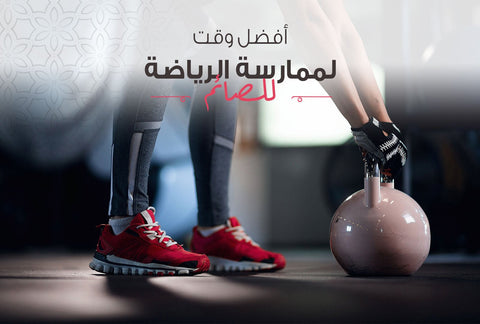With the advent of the holy month, some people are confused about exercising, and whether doing so might affect health, cause severe stress, or hinder the ability to perform daily tasks. The truth is that fasting does not prevent exercising, but there are conditions, which we will learn about in this article .
Top Tips for Exercising During Ramadan
As we mentioned, the primary goal of exercising during Ramadan is not to build muscle mass, but rather to burn fat and maintain physical fitness. It's important to adhere to some tips to ensure that exercise is safe during fasting and does not cause any health problems. These tips include :
- Maintaining a healthy and balanced diet: It is important to maintain a balanced diet during Ramadan, and eat foods rich in vitamins, minerals, complex carbohydrates, and proteins during Iftar and Suhoor to avoid stress, malnutrition, and low blood glucose levels. Exercise is also recommended, as mentioned above, after Iftar or close to it to replenish the body's calorie intake .
- Drink plenty of water: Exercising while fasting can cause your body to lose water, which can lead to dehydration. Therefore, it's important to drink 8-12 cups of water between Iftar and Suhoor, and avoid exercising if you experience symptoms of dehydration, including dizziness.
Dizziness, feeling thirsty, dark urine, dry mouth and eyes, and urinating less than 4 times a day .
- Stop exercising immediately if you feel tired: You should stop exercising immediately if you feel stressed or tired, lie down, and avoid any exertion until breakfast .
- Avoid exercising in hot weather: If Ramadan coincides with the summer, you should avoid exercising outdoors during the afternoon or on hot days. It is best to exercise when the weather is moderate or at night, as exposure to the sun during fasting may increase the risk of dehydration .
What is the best time to exercise during Ramadan?
The best times to exercise during Ramadan are during two periods :
1- An hour to an hour and a half before breakfast, so that the physical activity ends close to breakfast time to quickly replace the lost fluids, minerals and energy in the body .
2- Three to four hours after breakfast, when the body has completed the process of digesting food comfortably without experiencing any problems. Indigestion
The choice of time depends on age, health condition, and the purpose of exercising. In general, it is recommended to exercise during Ramadan at any time when the fasting person feels comfortable and happy while exercising and is able to exercise without fatigue .
Exercising in Ramadan before breakfast
Most people prefer to exercise in Ramadan before breakfast. Because there is free time during this period, activities, work and commitments decrease, while people get busy after breakfast. With worship, Visits and compliments .
It is also preferable to exercise just before Suhoor. If a person is able to exercise on an empty stomach, then they can exercise just before Iftar, taking into consideration that the weather is not too hot, and that the person gets plenty of water during Suhoor to avoid dehydration .
Tips for those who exercise during Ramadan before breakfast.
- Not recommended for elderly people And those with special health conditions Diabetics, hypertensive patients, and heart patients should exercise during Ramadan during this period, as the body is exhausted and at the peak of dehydration at the end of the Ramadan day .
- There is no objection to young people and those in good health exercising in moderate conditions, away from extreme heat or humidity .
- Preferably exercise In well-ventilated and air-conditioned enclosed spaces to protect the fasting person from the heat and heat stroke, as the hot weather increases the body’s loss of fluids and susceptibility to... Exposure to dehydration .
- Exercise should be done one to one and a half hours before breakfast, and the exercise should not exceed one hour so that the fasting person does not become overly exhausted .
- Exercise should be light to moderate intensity. Like walking Jogging, cycling, Swedish aerobics, or using moderate-speed, high-intensity machines .
Benefits of exercising during Ramadan before breakfast
- It works to activate the body and increase its efficiency in getting rid of toxins resulting from metabolic processes .
- It is ideal for those who want to lose weight, as blood sugar levels are at their lowest. At the end of the fasting day, The body resorts to stored fats and uses them as a source of energy .
- It increases the feeling of comfort and relaxation .
So, in general, it is recommended to choose a time when the person feels energetic and active to exercise, taking into account not choosing a time too long before breakfast .
Exercising in Ramadan after Iftar
It is not recommended to exercise during Ramadan immediately after breakfast or shortly after breakfast, as most of the blood, food, and oxygen are directed to the stomach. and the digestive system To complete the digestion process .
Tips for those who exercise during Ramadan after breakfast
- Do not rush to exercise while your stomach is full, but wait 3-4 hours before exercising .
- Drink enough fluids Before exercising and without exaggeration .
- Exercise in well-lit areas to avoid injuries .
- Do not exercise for more than an hour or with a high-intensity training load to avoid fatigue and stress .
Benefits of exercising after breakfast
These are some of the benefits of exercising in Ramadan after breaking the fast in Ramadan :
- fit This period the elderly And people with special health conditions .
- Motivate It speeds up metabolism .
- It helps burn excess calories from the food eaten. Exercising after completing digestion prevents the storage of calories from breakfast, because the priority in energy goes to the part that carries out the main activity, which is... Muscles
What foods are best to eat before and after exercising during Ramadan?
To replace depleted energy stores (glycogen), it is recommended to eat foods rich in carbohydrates. Some people think that sugary foods are the best, but it is preferable to choose healthy carbohydrates such as starchy vegetables and whole grains. Proteins (different types of meat ) should also be added (to increase muscle mass), such as:
Lean meats, beans, lentils, or a protein shake, and of course, drink plenty of water before and after your workout .
What is the best sport for a fasting person?
Resistance exercises are recommended to maintain muscle mass, which include :
- Bodyweight exercises such as squats and lunges .
- Push-ups and weightlifting .
- Leg, arm and abdominal exercises .
At the same time , it is recommended to limit cardio exercises during Ramadan, because doing them excessively leads to the consumption of glycogen from the body, which makes the body begin to consume stored proteins to obtain energy, which causes a decrease in muscle mass. Therefore, walking can suffice as one of the exercises.
Simple cardio exercises while fasting, and walking shortly before breakfast, are a good option to safely burn some calories .
Finally, exercising during Ramadan helps prevent excess weight gain. In general, Ramadan may not be the ideal time to try to increase muscle mass, as fasting can make that nearly impossible. Therefore, more important than gaining muscle is maintaining physical fitness and a healthy weight during the holy month, then returning strongly to your usual training regimen after Ramadan .
Consumer Awareness Department








Comments (0)
There are no comments for this article. Be the first one to leave a message!